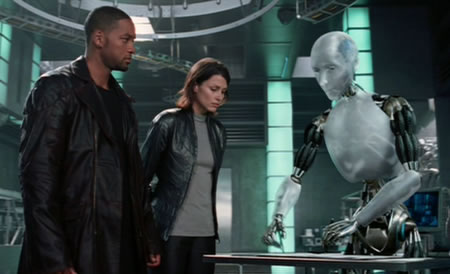It sure is funny how your mind wanders when you are in bed, recovering from an illness, half-way between sleep and alertness...
It was two weekends ago when the flu hit me - hard. I had all the typical symptoms and I spent a lot of time in bed, trying to rest and help my body fight-off the infection. It was during this time, that my mind wandered to thoughts of procreation and I marveled at the complex series of biochemical reactions which keep us all alive.
A few decades ago I remember learning that hard-wired in all living organisms is the fervent desire to ensure that they create offspring, so that their genetic material (DNA for humans) survives once they are no longer on this Earth. A definition of procreation could be the desire to create offspring, which will create more offspring, etc. Each species, in other words, wants to make sure that others like them will be around in the future.
If you are an animal, you need to worry about whatever predator(s) plans on having you for dinner. If you are a plant, you need to worry about the climate wherever you happen to have sprouted, as well as those animals which might come around and gobble you up. Regardless of what type of living organism you might happen to be, you also need to compete with other organisms for a limited amount of resources which are needed to sustain you. This is what scientists term the "Carrying Capacity" of an ecosystem, which I touched-upon in a previous post.
Thinking back to living things and the desire for procreation, I got to thinking about whatever virus was wreaking havoc on my body. While viruses are not technically living things, they are remarkably efficient at procreation. By hijacking other living cells, they force them to churn out many new copies of themselves, depleting the resources available to the infected cells and many times killing those host cells in the process. [Merriam-Webster definition of Virus]
Those new copies of the virus are then available to infect new cells, creating even more copies of themselves and starting the cycle anew.
Of course organisms have developed defensive mechanisms, which fight to eliminate the viruses infecting the organism's cells (in the process of fighting the infecting viruses, they can trigger symptoms such as those that were making me miserable). If however a virus has no way of leaving the body of the infected organism, its efforts at procreation will end when it exceeds the organism's carrying capacity (and the organism dies), or when the organism's defensive systems wipe-out all copies of the virus. Therein lies the sneaky genius of viruses: those that are effective at procreation have developed various means of jumping from one organism to another.
Two news stories about viruses caught my attention right around the time I was coming down with the flu.
The first dealt with Ebola, that modern day scourge which seems to suddenly show a resurgence in Western Africa, and what scientists are discovering about it's lethality related to an infected person's age (bad news for people my age).
The second dealt with something a bit stranger ... and scarier. Scientists examining ice cores from Northern Canada discovered two new types of viruses in frozen Caribou droppings that were 700 years old -- viruses are able to survive for centuries in ice.
Viruses are by far the most abundant biological entities on Earth and they outnumber all the others put together. They infect all types of cellular life including animals, plants, bacteria and fungi.
New versions/types of viruses keep getting created through genetic mutations.
Thankfully, genetic mutations also allow the various organisms at risk from viruses to evolve and cope with the viral onslaught.
It staggers my mind to think of the glorious system of checks and balances present in the environment we live in and causes me to pause in awe at the way life has evolved on this planet we call Earth.
It was two weekends ago when the flu hit me - hard. I had all the typical symptoms and I spent a lot of time in bed, trying to rest and help my body fight-off the infection. It was during this time, that my mind wandered to thoughts of procreation and I marveled at the complex series of biochemical reactions which keep us all alive.
A few decades ago I remember learning that hard-wired in all living organisms is the fervent desire to ensure that they create offspring, so that their genetic material (DNA for humans) survives once they are no longer on this Earth. A definition of procreation could be the desire to create offspring, which will create more offspring, etc. Each species, in other words, wants to make sure that others like them will be around in the future.
If you are an animal, you need to worry about whatever predator(s) plans on having you for dinner. If you are a plant, you need to worry about the climate wherever you happen to have sprouted, as well as those animals which might come around and gobble you up. Regardless of what type of living organism you might happen to be, you also need to compete with other organisms for a limited amount of resources which are needed to sustain you. This is what scientists term the "Carrying Capacity" of an ecosystem, which I touched-upon in a previous post.
Thinking back to living things and the desire for procreation, I got to thinking about whatever virus was wreaking havoc on my body. While viruses are not technically living things, they are remarkably efficient at procreation. By hijacking other living cells, they force them to churn out many new copies of themselves, depleting the resources available to the infected cells and many times killing those host cells in the process. [Merriam-Webster definition of Virus]
Those new copies of the virus are then available to infect new cells, creating even more copies of themselves and starting the cycle anew.
Of course organisms have developed defensive mechanisms, which fight to eliminate the viruses infecting the organism's cells (in the process of fighting the infecting viruses, they can trigger symptoms such as those that were making me miserable). If however a virus has no way of leaving the body of the infected organism, its efforts at procreation will end when it exceeds the organism's carrying capacity (and the organism dies), or when the organism's defensive systems wipe-out all copies of the virus. Therein lies the sneaky genius of viruses: those that are effective at procreation have developed various means of jumping from one organism to another.
Two news stories about viruses caught my attention right around the time I was coming down with the flu.
The first dealt with Ebola, that modern day scourge which seems to suddenly show a resurgence in Western Africa, and what scientists are discovering about it's lethality related to an infected person's age (bad news for people my age).
The second dealt with something a bit stranger ... and scarier. Scientists examining ice cores from Northern Canada discovered two new types of viruses in frozen Caribou droppings that were 700 years old -- viruses are able to survive for centuries in ice.
Viruses are by far the most abundant biological entities on Earth and they outnumber all the others put together. They infect all types of cellular life including animals, plants, bacteria and fungi.
New versions/types of viruses keep getting created through genetic mutations.
Thankfully, genetic mutations also allow the various organisms at risk from viruses to evolve and cope with the viral onslaught.
It staggers my mind to think of the glorious system of checks and balances present in the environment we live in and causes me to pause in awe at the way life has evolved on this planet we call Earth.




